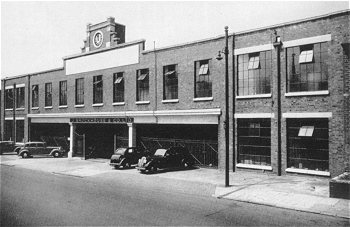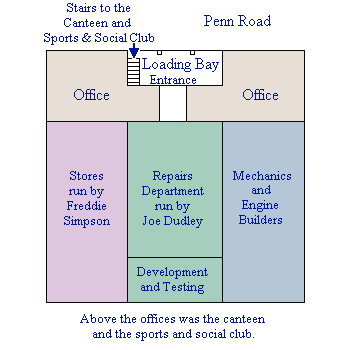|
Elms Works and
Social Club
The Elms works on the opposite side of the Penn Road was finished in
1928. It was called the Elms because there was originally a big Elms
lodge on the ground where it was built. I don't know what it was, there
were a lot of trees, like a mansion.
The works became our repair shop
under Joe Dudley, which I worked for, for about 12 months. I repaired
engines. Albert Collins worked there, George Dance worked there doing
their developments, down the bottom of it. They had a special place at
the bottom, the repair place was at the top, under Joe Dudley. I had
about 12 months there. As a matter of fact that's where I saw the first
overhead camshaft engines. They made about 20 but they never took off,
and the remains of them were still there. Nobody ever mentioned them,
but I came across them, asked the lads and they said that they made
about 20 of them. It never developed into anything any good, so they
were just discarded. I never realised that they did make an overhead
camshaft engine. Another thing we made was a 'Model 16'. It was all tuffnall gears, a train of tuffnall gears up the front case, but it
never took off. It lasted about 12 or 18 months and soon petered out. It
was very silent but the gears wouldn't wear long enough.
|
|

Elms Works in the mid 1950's. |
We never had a sports club until the Elms was
opened in 1928. I can remember that because I had always been
interested, and always been associated with the men, Horace
Lewis, Billy Shadpolt, and Billy Plant, and all the people that
used to develop what they could on sport. We had a football
team, a bowls team, we were never without a bowls team, and they
used to play on the front of the Molineux Hotel. |
| The hotel had a big bowling green at the front with railings around.
It used to be ideal to go up there on a Saturday afternoon, have a glass
of lemonade and watch our lads bowling. The Molineux bowling club used
to bowl at the back, on their own special green which overlooked the
wolves. They could bowl and they could watch the wolves playing football
for nothing. They could look down on the pitch, so we had to play in the
front where you couldn't see.
I remember us having this building where
we had our first sports committee and I was under the age. You couldn't
go on the committee until you were 18, and I wasn't. We hadn't got any
money, they decided that the workers would have to pay two pence a week
for the contributions to the sports club. We had cards and dominoes, the
usual, and we decided to use the canteen on the top floor as the sports
club. We used to move the benches and hold dances. Our mothers used to
make cakes and we would take them down, sell them and get a bit of
revenue, and we got enough money to buy a bagatelle table and a snooker
table. |
| At St. Marks Church, down Chapel Ash they closed
up, and so we decided that we buy them off them. We hired a
handcart, which you could hire for sixpence an hour from
Edwards, and we took this handcart, I went with them as a lad
down to St. Marks on this night. We couldn't remove the
billiards table but we could remove the bagatelle table, so they
dismantled it all and put it on this cart, and I remember
carrying the paraffin cycle lamp in front of them.
They pulled
this cart with ropes, with two or three at the front and others
at the back, and we brought the bagatelle table up. They put
this up at the weekend and we got revenue from that. |

A plan of the works. |
| We used to charge a penny a game. The people who used to run the
snooker and billiard table, dismantled it, and brought it up and fitted
it. That was fourpence a game and we started to build up, that's how it
started. I eventually went on to the sports and social committee and
eventually became chairman, and I was chairman for 30 years. We used to
give the kids a party towards Christmas and we used to take them all to
the theatre, to the pantomime, every year, we had some jolly times. |
 |
|
 |
|
 |
| Return to
Testing and Racing |
|
Return to
the Beginning |
|
Proceed to
The Later Years |
|